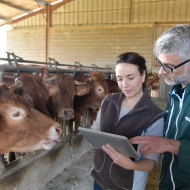
Ongoing surveillance by SRUC provides insight
The rate of antimicrobial resistance remains relatively low and stable, according to a study from Scotland’s Rural College (SRUC) veterinary services.
This is the second consecutive year that SRUC have collaborated with Food Standards Scotland to collect data on commensal E coli cultured from the faeces of healthy livestock presenting at abattoirs in Scotland.
The study – which was contributed to the ‘Scottish One Health Antimicrobial Use and Antimicrobial Resistance in 2018 report’ – found that, once again, levels of non-susceptible E coli were greater in poultry and pigs than in cattle and sheep, however, when compared with 2017, levels for each animal species remained relatively stable.
Of the 12 antibiotics tested for all four hosts, ampicillin and tetracycline possessed some of the highest levels of non-susceptibility for the second year running. These are some of the most frequently used antibiotics in the treatment of infections in livestock. Continued data collection and annual reviews will provide a clearer insight into changes in antimicrobial resistance over time.
Farm and companion animal diagnostic services offered by SRUC and Capital Diagnostics also found that:
- Meticillin resistance was not detected in any Staphylococcus aureus from livestock and levels of non-sensitive strains for other antibiotics appear stable and remain relatively low
- In dogs and cats, six per cent of coagulase positive staphylococci were found to have meticillin resistance. Levels of non-susceptibility in strains of Staphylococcus pseudintermedius and Staphylococcus aureus from companion animals have fallen for several antibiotics, though remain fairly high for penicillin and fusidic acid
- Carbapenemases were not detected in any animal diagnostic sample
- Extended spectrum beta-lactamases were identified in two E coli and two Klebsiella pneumoniae from dogs and in single E coli and K pneumoniae isolates from cattle.
Dr Geoff Foster, microbiology manager at SRUC veterinary services, said: “Reducing the levels of non-sensitive microbes to antibiotics in food producing and companion animals is important to both animal and human health. This is our second year of full data and, while farmers, vets and the wider public should welcome stability in the data, we have a shared responsibility to combat anti-microbial resistance.
“Vigilance and best practice in the use of antibiotics remains the key to preserving their future efficacy.
“The advice remains the same: whenever possible use narrow rather than broad spectrum antibiotics, be very careful about when you advise the use of antibiotics as a preventative medicine and promote good husbandry to prevent the spread of disease in the first place.”



 RCVS Knowledge has welcomed Professor Peter Cockcroft as editor-in-chief for Veterinary Evidence.
RCVS Knowledge has welcomed Professor Peter Cockcroft as editor-in-chief for Veterinary Evidence.